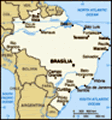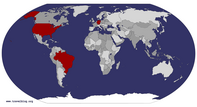Advertisement
Published: March 24th 2014
Viele Ecken in Brasilien sind wirklich hässlich – aber den Flecken, den wir letzten Sonntag besucht haben, zählte zum Glück nicht dazu. Da sind wir mal eben „kurz“ nach Paraty gefahren sind. Im Klartext: Drei Stunden über kurvige Straßen, Serpentinen hinunter ziemlich rasant gen Meer, in ein verschlafenes, sehr hübsches und damit leider auch teures Fischerdorf. Der Reiseführer sagt, dass Paraty alt ist, oh, sie an, der Kolonialstil der portugisischen Invasoren ist dort bestens erhalten geblieben. Unsere Gruppe sieht nicht viel vom Dorf, weil es ruck zuck auf ein Boot geht. Dieses legt samt Kapitän und seiner wirklich grossen Familie ab und schippert gemütlich über das Meer zu einer Lagune, wo der Rest des Tages mit Baden, Biertrinken und BBQ zugebracht wird. Das Highlight ist wider Erwarten jedoch das Ende der Bootstour, als man sich in eine viel zu kleine Lücke zwischen zwei Boote am Steg quetscht. Da wird gedrückt und geschoben. Irgendwie passt am Ende tatsächlich dieser grosse Kan noch rein. In einem der besuchten Seminare wurde im Rahmen der kulturellen Eigenschaften der Brasilianer sogar ein Wort dafür eingeführt: Man nennt es das Brazilian JEITINHO. Es steht für Flexilbiltät und Kreativität, die sowohl positiv als auch negativ ausgelebt werden kann.
Many Brazilian places lack embellishment and simply look dull and dirty – fortunately, the place we visited last Sunday was not one of those. That day, we drove only a ‘short’ distance to Paraty. Frankly speaking: Three hours of driving way too fast to the coast and along the lush coastline of Southeastern Brazil, brought us to a sleepy, shiny, and white fisherman’s village. The travel guide indicates that Paraty is quite old, but expensive. Nevertheless, the colonial style of the Portuguese invaders is still visible there. Our group doesn’t see much of the village though, because quite fast we make our way to an awaiting boat and sail away. Off we go, with the captain’s entire, and extended family on board. The rest of the day is spent well with swimming, beer tastings, and BBQ. The highlight of the tour is not as expected the trip to the remote island but on returning to the port. Here, the boat is squeezed among a row of already towed away boats by pushing the other boats away. Somehow the captain and his crew manage to get the boat among the others in the spot that looked far too
small for the huge boat. During one of our seminars we were told about some cultural traits of Brazilians and in the wake the word Jeithino introduced. It stands for flexibility and creativity that can be used in a positive or negative way – in Paraty, we truly experienced that day.
Sommer, Sonne, Sonnenschein - für mehr reicht es nicht Summer, sun, sunshine – more is often hard to get
Man merkt das hier jeden Tag, die Brasilianer sind gut im Spontanen, wenn es um langwierigere Prozesse geht, sieht es leider nicht so gut aus. Ein großes Problem ist hier die Infrastruktur. Da man sich in den 50ern dafür entschlossen hat, lieber alles mit dem Lastwagen zu transportieren anstatt auf Schienen, platzen mittlerweile die Straßen aus allen Nähten. In Sao Paulo gibt es ein Rotationsprinzip. An gewissen Tagen dürfen Autos mit entsprechenden Nummern nicht fahren, um den Verkehrssupergau noch ein bisschen zu verzögern. WM-Stadien wurden ins Nichts gebaut, jetzt steht man vor dem Problem, wie die ganzen Touris überhaupt dorthin kommen sollen. Die Energieversorgung ist ein weiterer Knackpunkt, zur WM haben die Firmen in Sao Paulo und Rio geschlossen. Man will damit verhindern, dass es
überall Blackouts gibt. Offiziell wird das natürlich nicht so kommuniziert. Aufgrund der Dürre dürfen sich auch alle Touris auf eine knappe Wasserversorgung gefasst machen. Die Trockenperiode kommt erst noch, schon jetzt sind die Wasserreserven fast aufgebraucht. Zur WM kann es also passieren, dass man das ein oder andere mal dreckig ins Bett steigen muss.
One can experience it every day, Brazilians are good in doing stuff spontaneously. When dealing with thorough processes that take more time to complete, it doesn’t look to well anymore. A big issue in this country is the infrastructure, for instance. Back in the 50s, one decided in favor of trucks to manage the delivery of goods within this vast country. Because one didn’t establish a railroad system, the streets are bursting and are way beyond their capacity. In Sao Paulo, there is a rotation system in use. Certain car plate numbers cannot drive on specific days within the city limits in order to avoid super traffic jams. Because of poor infrastructure and little space, world cup stadiums were built in the middle of nowhere. Now, nobody knows how tourists are supposed to get there. Speaking of energy, the government has ordered holidays for the
days games take place in the big cities in order to avoid black outs. Officially, those issues are not communicated at all. In addition, tourists should be looking forward to a water shortage due to the extreme heat in January that depleted all natural water reserves. For the world cup, that could mean that one has to go to bed dirty from time to time.
Do you speak Englisch? Ähhh, eher nicht so... Do you speak Englisch? No, not really... Ja, und zum Schluss noch etwas zur Sprachfertigkeit in diesem Land. Englisch kann hier keiner, auch unter den gut ausgebildeten Leuten sprechen nur circa ein Viertel Englisch. Die Schulausbildung im Allgemeinen ist hier erschreckend. Viele Kinder gehen nicht zur Schule. Der Besuch eines Kindergartens zeigt, dass viele Kinder nur dort landen, weil sie dann den Eltern nicht auf der Tasche liegen. 5 Mahlzeiten am Tag bekommen die Kleinen dort. Schade, wenn Schulbildung kein Allgemeingut ist, sonder ein Privileg der Reichen. Das Paradox wird uns im einem Seminar bestätigt. Die Reichen schicken ihre Kinder auf Privatschulen, damit sie dort u.a. Englisch lernen, um dann an einer der besten, öffentlichen Unis studieren zu können, wie beispielsweise der USP
(University of Sao Paulo, die die beste Uni Lateinamerikas ist!). Für die Armen geht der Weg andersrum: Erst öffentliche Schule, dann private Uni. Überhaupt, das System Uni funktioniert hier ganz anders. Tagsüber treffen wir kaum Studenten an der Uni. Immerhin sind wir insgesamt eine Woche an der Uni...Woran liegt es? Auf einem Event am Abend lüften einheimische Studierende das Geheimnis. Um die Studiengebühren bezahlen zu können, arbeiten fast alle Studenten tagsüber. Die meisten Kurse finden abends statt. Ach so, wieder etwas gelernt.
Ok, I saved this little piece of observation till now. English might be a world language, but for some sort of reasons it hasn’t made its way to Brazil yet. Only a few people have a decent command of it, about a quarter but that’s a rather nice guess. The education is so bad; many kids don’t go to school. Hence, they don’t learn it at school. When visiting a kinder garden, many kids are simply there because this way, their parents don’t have to feed them. They get 5 meals a day there. It is so sad, when education is not a common good but a privilege of the elite. The paradox is shown to us
during one of our seminars, the rich send their kids to private schools. This way they learn English and can attend one of the best public universities such as the USP (University of Sao Paulo, the best university in Latin America!). For the poor it’s the other way around: First one attends a public school, later on a private university. Indeed, the way of studying over here is so different from what I’m used to. During the day, we barely meet any students. Why is that? An international get together at the university UNITAU one night tells us why. In order to be able to pay for student fees, almost every student has to work during the day. Most of the classes take place in the evening. Once more, I learned something.
Goooool - und läuft da nicht Lucio mit rum?!
Goooool – and isn’t that Lucio?!
Das fasst übrigens ganz gut auch die vergangene Woche zusammen. Seit Mittwoch residiert die Gruppe in Santos. Dort haben reiche Paulistas ihren Zweitwohnsitz, direkt am Meer, in unmittelbahrer Nähe zum größten Hafen Brasiliens. Der Strand ist genial, 13km
lang, 30m breit. Ideal zum Laufen. Ich kann es bezeugen, so gut bin ich noch nie am Strand voran gekommen. Mit dem Sport möchte ich auch diesen Blogeintrag beenden. Heute stand ein Fussballspiel auf dem Programm. Santos gegen Palmeiras. Wem das jetzt nicht viel sagt, aus Santos kam Pelé. Dementsprechend lacht der Alte einen auch von vielen Plakten hier im Ort an. Zum Spiel gibt es leider nicht viel zu sagen. Der Brasilianer fällt gern, rennt viel, aber oft kopf- bzw. torlos umher. Am Ende steht es 2:1 für die Heimmannschaft. Zum Glück muss man sagen, ein Unentschieden wäre inmitten der emtionalen Meute, vor denen die Spieler mit einer Plastikwand geschützt werden müssen, eher unangenehm geworden. An die alte Heimat werde ich auch noch erinnert. Auf einmal rennt Lucio an uns vorbei. Eine kleine Recherche bestätigt, jup, das ist der FC Bayern-Mann, der 2009 den Verein verliess und seit Anfang 2014 für Palmeiras Sao Paulo kicken darf.
That sums up last week pretty well. Since Wednesday, the group resides in Santos. Rich Paulistas have their second home there, right at the beach, and in walking distance to the biggest port in Brazil. The beach is nice (compared
to German beaches, at least...). It’s about 10 miles long and 30 meters wide. It’s ideal for jogging. I know what I’m writing about since I jogged a lot there. Hence, I would like to conclude this blog entry with sports. Today, a soccer match was THE event. Santos vs. Palmeiras. Whom doesn’t know either of the teams. Don’t worry. Pelé is from Santos. Hence, the old guy is omnipresent in Santos. The game itself was ok. The Brazilian likes to fall and fake a lot. He also likes to run, but often without any game plan. So it’s good that in the end, Santos wins 2:1. Luckily, one has to say, because a 2:2 would have been uncomfortable among the rather emotional crowd that players were fenced off against with a plastic wall. I’m reminded of Munich as well, when all of a sudden Lucio passes by our stands. A quick research online later that night shows that we have truly seen the FC Munich player who left the club in 2009 and is part of the Palmeiras team since the beginning of 2014.
Das soll für heute reichen! Mit sonnigen Grüßen und leider keinem Caipi
zu meiner Rechten verabschiede ich mich bis zur nächsten Woche!
Ok, that is enough for today! I bade farewell with sunny greetings and no Caipi to my right, unfortunately. Talk to you next week!
Tchau
Jule
Advertisement
Tot: 0.106s; Tpl: 0.014s; cc: 10; qc: 50; dbt: 0.0554s; 1; m:domysql w:travelblog (10.17.0.13); sld: 1;
; mem: 1.2mb





















